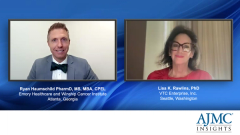
Exploring the Shortage of Psychiatrists
Panelists discuss how the global shortage of psychiatrists contributes to patient burden by necessitating expanded training for other health care professionals, including nurse practitioners, physician assistants, primary care doctors, and law enforcement to recognize and manage schizophrenia symptoms.
Episodes in this series

Patients with schizophrenia face significant barriers to accessing specialized mental health care due to severe workforce shortages in psychiatry. This shortage affects patients worldwide, with the global prevalence of schizophrenia remaining constant at approximately 1% across all populations. The shortage is particularly acute in developing countries, where patients have even less access to specialized care. Health care systems recognize that they will never have sufficient mental health specialists to meet patient demand, necessitating alternative approaches to care delivery.
Emerging health care professionals are increasingly filling gaps in mental health care for patients with schizophrenia. Psychiatric nurse practitioners represent the fastest-growing field in health care, providing patients with specialized knowledge and skills traditionally available only from psychiatrists. Physician assistants are also receiving enhanced mental health training, expanding the pool of providers capable of caring for these patients. High schools are even developing programs to encourage students to enter mental health fields, addressing long-term workforce needs.
Patients with schizophrenia increasingly encounter mental health awareness among nonpsychiatric health care providers. Family practice physicians, pediatricians, internal medicine doctors, and emergency room staff now receive mental health training as part of their education. Even law enforcement officers receive training on schizophrenia and psychosis, helping them approach patients with compassion rather than force during crisis situations. This broader educational approach aims to improve patient experiences and outcomes across all points of contact within the health care system.
Newsletter
Stay ahead of policy, cost, and value—subscribe to AJMC for expert insights at the intersection of clinical care and health economics.











